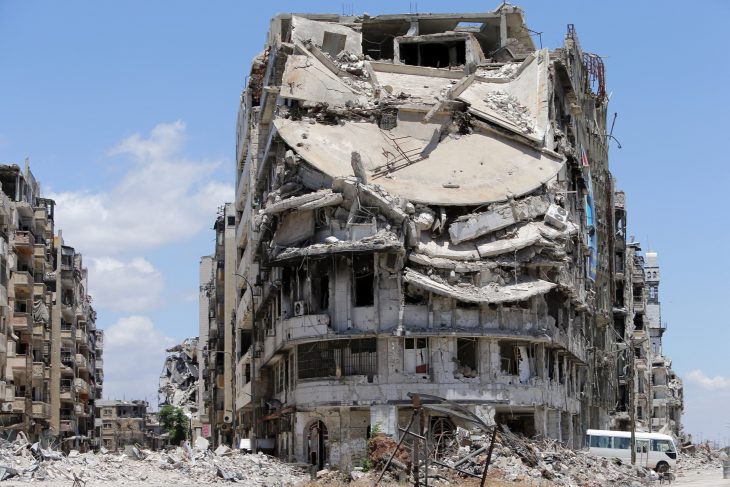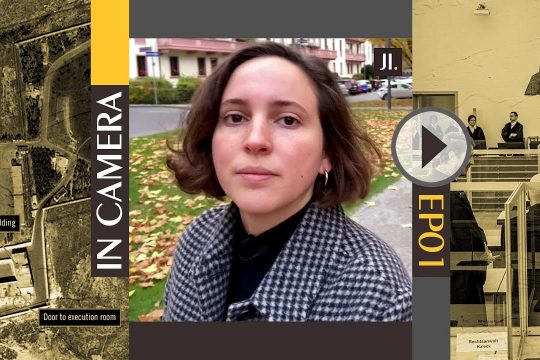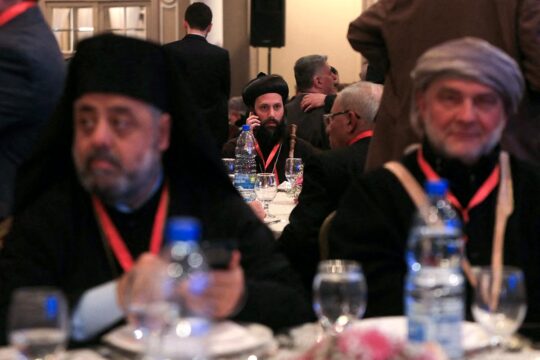On 22 February 2012, French photojournalist Rémi Ochlik and American journalist Marie Colvin were killed in the bombing of a building in Homs, western Syria. The missile fire, blamed on the Syrian army, also seriously injured journalist Edith Bouvier, who was repatriated to Paris ten days later. On 2 March, the Paris prosecutor's office opened a preliminary investigation into the "homicide" of Rémi Ochlik and the "attempted homicide" of Edith Bouvier. While the investigation was stalling, Edith Bouvier's lawyer and the International Federation for Human Rights (FIDH) fought for the case to be handed over to specialised magistrates. “This was not a case of murder and attempted murder, but a war crime," insists Clémence Bectarte, a lawyer associated with the FIDH. “We have several pieces of evidence showing that the building housing the journalists was deliberately targeted by the regime to silence them.” The charges were eventually requalified two years later, and the case was transferred to the prosecutor's office specialized in international crimes.
When the specialised prosecutors took up the case in 2014 - the first in France linked to the ongoing Syrian conflict - the War Crimes Unit was only three years old. Established at the end of 2011, in the wake of the integration of the Statute of the International Criminal Court (ICC) into French law, it was attached to the Paris Public Prosecutor's Office and brought together three prosecutors. Three investigating judges were also dedicated to these extraordinary cases. Their 'executive arm' within the Gendarmerie Nationale (French military police) - the Central Office on Crimes against Humanity, Genocide and War Crimes (OCLCH) – was created in 2013.
The rise of a specialised judicial branch
Ten years after its creation, the War Crimes Unit is now attached to the Anti-Terrorism Prosecutor's Office. “Since July 2019, we have five prosecutors, supported by three specialised assistants," explains Aurélie Belliot, the deputy prosecutor at the head of the Unit. "And we work with three specialised investigating judges, who will be joined by a fourth in September.” For its part, the OCLCH currently has thirty gendarmes and four police officers. Seven new investigators will join them in September, and the staff could be increased again in 2022, according to General Jean-Philippe Reiland, commander of the OCLCH.
For in recent years the files have piled up on the desks of magistrates and gendarmes. “Initially, most of our resources were devoted to cases related to the genocide of the Tutsis in Rwanda," recalls Aurélie Belliot. “Today, these cases remain important, with 31 preliminary or full investigations ongoing. But we are now dealing with crimes committed in some thirty different countries. And the number of Syrian cases has increased steadily in recent years.” With 24 preliminary investigations and 15 cases opened out of 150 files in progress at the Unit, Iraqi-Syrian investigations are now in the majority.
This exponential increase is due to an influx of cases concerning people who are not eligible for refugee status: the so-called "1F" files, in reference to an article of the 1951 Geneva Convention. This article states that any State which has pressing reasons for considering that an individual has committed serious crimes against peace in their country may refuse them protection. And since July 2015, the French Office for the Protection of Refugees and Stateless Persons (OFPRA) has had the duty to report such cases to the state prosecutor, who can then request an investigation into the said individual. "But we must not neglect the important role played by civil society," adds General Reiland. And Syrian cases in particular do not lack relaying networks in France, he notes. Victims, supported by Syrian exile organisations and international NGOs, have also initiated investigations.
The role of civil society
In July 2012, a few months after the start of the preliminary investigation in the Ochlik/Bouvier case, it was a complaint from the FIDH and the Human Rights League (LDH) that led to the opening of an investigation for complicity in crimes against humanity against the company Qosmos. This French company was accused by the two NGOs of having supplied electronic equipment used by the regime of Bashar Al-Assad in a vast operation of phone-tapping and surveillance of its population. The case was eventually dismissed in December 2020. If the company Qosmos "could not but be aware that it was taking the obvious risk of assisting a violent repressive policy constituting crimes against humanity and acts of torture, the judicial investigation did not demonstrate a causal link between the dysfunctional probes sold by Qosmos and the torture and crimes against humanity attributable to its client, the Syrian government," concluded investigating judge Claire Thépaut in a decision revealed by NextInpact.
The testimonies and information provided by civil society are "a significant asset, because the Syrian investigations are all the more complex as access to Syrian territory is impossible," notes the commander of the OCLCH. Aurélie Belliot recalls, however, that these organisations and civil parties are not, by definition, neutral. If they can be intermediaries in the search for witnesses, it would be dangerous to "subcontract" this type of investigation, concurs General Reiland: "We must be beyond reproach on the impartiality of our investigations. That is why we have separated, within the OCLCH, the International Crimes Investigation Division, which deals with the testimonies and the data collected; and the Strategy Division, which deals with intelligence gathering, contacts with civil society, international organisations and foreign police forces."
Since 2012, Syrian investigations have multiplied in France, the majority of which concern alleged crimes committed by the regime. And this despite certain legal obstacles. “Unlike Germany, we do not have complete universal jurisdiction over war crimes, genocide and crimes against humanity," explains Aurélie Belliot. "As regards crimes committed abroad, French justice has jurisdiction if one of its nationals is involved, whether as a victim or an alleged perpetrator. Our jurisdiction then extends to international crimes committed by a foreign perpetrator if the suspect is a regular resident in France.” Exceptions to the rule: in cases of torture and enforced disappearance, as well as crimes falling under the jurisdiction of the former UN tribunals for Rwanda (ICTR) and the former Yugoslavia (ICTY), the mere presence of the suspect on French territory is sufficient for the judiciary to take up the case.
The virtues of structural investigations
For Clémence Bectarte, 2015 marked a legal and political turning point in the Syrian investigations. In September 2015, the Ministry of Foreign Affairs placed the "Caesar" file on the War Crimes Unit's desk, codenamed after the Syrian military photographer who had exfiltrated some 28,000 photos of tortured bodies from the Syrian regime's detention centres. A few months earlier, France had tried to convince the UN Security Council to refer the crimes committed in Syria to the ICC. The Russian and Chinese vetoes had put an end to it. The disclosure of the Caesar file is "a political move, a way for the French government to show that it was committed to this case," comments Bectarte, "but despite the nice talks, only one investigator was in charge of this titanic investigation at the time. Until the Unit and the OCLCH fought to obtain more resources for this case and to make it a real structural investigation.”
The investigation was originally intended to determine whether the French judiciary had jurisdiction, but it quickly turned into an in-depth investigation into the detention system of the Syrian intelligence services, leading to the creation of a joint investigation team with Germany. It was in this context that, on 12 February 2019, French gendarmes and German police officers arrested three Syrians, on both sides of the Rhine. Among them, Sergeant Eyad Al-Gharib, convicted last February by a German court for complicity in crimes against humanity, and his co-accused, Colonel Anwar Raslan, whose trial has been going on for more than a year in Koblenz.
The investigation against the suspect arrested in France seems to make no headway. The suspect had to be released under judicial supervision. A bitter setback? General Reiland assures that the investigation is still ongoing. But it seems that the French investigators are struggling to gather evidence of the suspect's involvement in the crimes of Syrian intelligence. If it seems established that he worked for the regime during the bloody hours of 2011 and 2012, Abdulhamid C. would have held only a minor role in the hierarchy - unlike the accused in Koblenz - and his direct participation in the crimes committed remains to be proven. For the time being, this Franco-German investigation into the Caesar case has essentially led to proceedings on the other side of the Rhine, General Reiland acknowledges. The officer partly explains this by the importance of the Syrian exile community in Germany. "There are more witnesses and victims who can contribute to the investigation," he says. The probability that former torturers have found refuge there also seems higher than in France.
But the “structural investigation” was not totally without impact in France. For it has fed into another, opened after the complaint filed in 2016 by the French-Syrian Obeida Dabbagh, on the disappearance of his brother and nephew in the jails of the Assad regime, three years earlier. The disappeared Mazen and Patrick Dabbagh also had dual nationality, automatically allowing the opening of an investigation in Paris. The Dabbagh case has eventually led to the issuance of three international arrest warrants in October 2018, against senior officials of the Syrian regime: Abdel Salam Faraj Mahmoud, director of investigations of the Mezzeh branch (a district of Damascus); Jamil Hassan, the head of Air Force intelligence, also targeted by a German arrest warrant; and, at the very top of the hierarchy, Ali Mamlouk, director of the Office of National Security and number 2 of the regime. "These arrest warrants were made possible both by Obeida Dabbagh's complaint and by the information gathered in the context of the Caesar investigation, making it possible to trace the chain of command up to the highest level of the state," emphasises Bectarte, who represents Dabbagh in the case.
This is the whole point of an in-depth investigation, underlines General Reiland: "A structural investigation allows us to feed and open other investigations, since we are analysing material that can allow us to go up the chain of command and thus determine responsibilities.” However, it seems unlikely that these very high-ranking members of the regime will ever be tried before a French court. France has the possibility of opening trials in absentia, but they remain rare.
A triple dynamic driven by political, judicial and activist circles
Trials linked to the Syrian conflict could however be initiated in the coming years, this time involving members of Islamist groups. In the wake of the Caesar structural investigation, the Unit opened another such investigation in 2016, focusing on the crimes of the Islamic State (ISIS) organisation against ethnic and religious minorities, particularly the Yezidi population. Two investigations targeting French ISIS fighters are underway, dealing with charges of genocide and crimes against humanity.
In June 2019, the Syrian Center for Media and Freedom of Expression (SCM) of lawyer Mazen Darwish gave another boost by filing a complaint in France, targeting Jaish Al-Islam. This armed group dominated several areas of the Damascus suburbs through terror until 2018. Darwish suspects the Islamist faction of being behind the disappearance of the lawyer Razan Zaitouneh and her three colleagues, kidnapped in December 2013 while documenting crimes committed in the area. Six months after the complaint was filed and an investigation opened, Islam Allouche was arrested by OCLCH in Marseille. His real name is Majdi Mustafa Nameh, a former spokesman for Jaysh Al-Islam. He is under investigation for war crimes, torture and enforced disappearances. After having fled to Turkey, the man in his thirties had morphed into a "security expert". And he seemed to have fooled the French intelligence services. Having arrived in France on a student visa, he had been living incognito in Marseille since November 2019.
Last March, four months after launching a similar procedure in Germany, the SCM, the Syrian Archive organization and international NGO Open Society Justice Initiative also filed a thick file on the Unit’s desk with evidence of chemical weapons attacks in 2013 and 2017. For these organisations, there is no doubt that these attacks were perpetrated by the regime as part of a widespread policy of using chemical weapons against the Syrian population. The French complaint was followed by a similar move in Sweden last April. The three NGOs hope that European justice systems will join forces in a joint investigation team, as in the Caesar investigation.
“The rise of all these cases is linked to a triple dynamic," says Bectarte. “On the one hand, there was the political will in France to commit to these issues, but also a real involvement of the judicial actors who fought for more resources for their investigations, who went to look for witnesses abroad, etc. And finally, these cases also exist thanks to the dynamic impelled by Syrian organisations that are totally committed to the judicial process, by setting up cases and filing legal suits.”
The slowness of French investigations
Yet, while investigations are multiplying no trial on international crimes committed in Syria has been held in France thus far. This could be partly explained by the process in the French justice system, which is much longer than in Germany, where the trial must start less than two years after the arrest of a suspect. German trials can last for several years, but in France it is the investigation that is often prolonged. It can last three years, even longer in the case of the most serious crimes. The time between the arrest of a suspect and his or her trial is very long.
There also seem to be fewer indictments in France than in northern Europe. "Aside the international arrest warrants issued in the Dabbagh case, French investigations are still struggling to transform into trials," notes Clémence Bectarte. Such delay is explained, she claims, by the restrictions imposed on French "universal" jurisdiction, which would tie the hands of justice. "The judicial results are not commensurate with the progress made in the French investigations and in particular the Caesar structural investigation, which has enabled a vast amount of evidence to be accumulated," the lawyer regrets.
However, the work carried out by French investigators is not limited to France, recalls Aurélie Belliot, who insists on the need for European and international mutual assistance in these procedures. “Our investigations feed into those of our counterparts and vice versa," she insists. "We preserve evidence and make it accessible for current or future proceedings, whether in France or abroad.”







